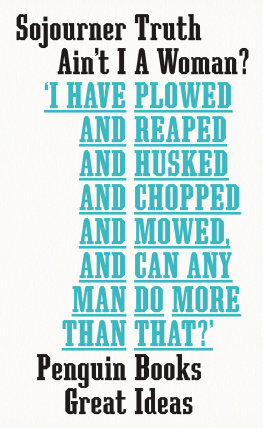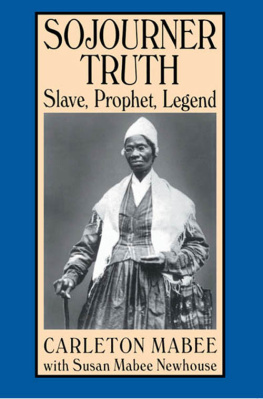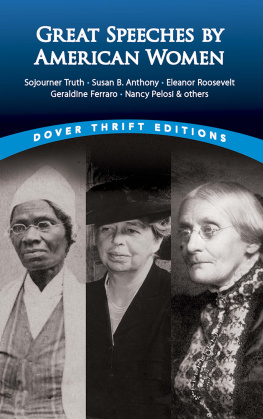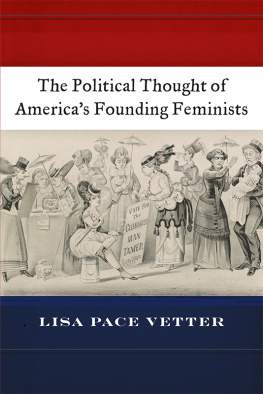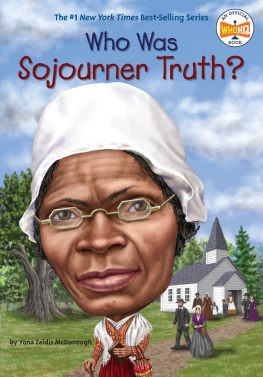Sojourner Truth
c. 17971883
Sojourner Truth
AINT I A WOMAN?

Penguin Books
UK | USA | Canada | Ireland | Australia
New Zealand | India | South Africa
Penguin Books is part of the Penguin Random House group of companies whose addresses can be found at global.penguinrandomhouse.com.

Some extracts taken from The Portable Nineteenth-Century African American Women Writers, edited by Hollis Robbins and Henry Louis Gates, Jr, published in Penguin Classics in 2017, and from Narrative of Sojourner Truth published in Penguin Classics in 1998.
This selection published in Penguin Books 2020
Cover artwork: David Pearson
ISBN: 978-0-241-47237-8
This ebook is copyright material and must not be copied, reproduced, transferred, distributed, leased, licensed or publicly performed or used in any way except as specifically permitted in writing by the publishers, as allowed under the terms and conditions under which it was purchased or as strictly permitted by applicable copyright law. Any unauthorized distribution or use of this text may be a direct infringement of the authors and publishers rights and those responsible may be liable in law accordingly.
Note on the Text
This is a collection of speeches by Sojourner Truth. It also includes speeches and articles by other African-American women who followed her example and campaigned for equal rights for Black women, to show how these ideas developed over the nineteenth century.
Sojourner Truth could not read or write, so we can only access her words through the accounts of other writers. This means that the extra veracity of these speeches cannot be confirmed. This is particularly true of her most famous speech, Aint I a Woman?, delivered at the Womens Rights Convention in Ohio. The first version of the speech, written soon after the event and edited by her friend Marius Robinson, does not include the phrase which has since become famous. The more widely known second account was written by prominent feminist and abolitionist Frances Gage twelve years later, and contains inaccuracies. We have reproduced both here.
Some journalists and activists recorded her words in the southern dialect associated with slaves, which Truth, who grew up speaking Low Dutch in New York State, would not have used. Truth herself seems to have pushed back against this. She kept a clipping from an article in the 1851 issue of the Kalamazoo Daily Telegraph in one of her scrapbooks, which said that People who report her often exaggerate her expressions, putting in to her mouth the most marked southern dialect, which Sojourner feels is rather taking an unfair advantage of her. For this reason, where this occurs, we have put the text into standardized English, and in some cases have added paragraph breaks. Of course, this is not necessarily an accurate representation of Truths style of speaking either. As Truth said in an 1867 speech, they cant put things down on paper as we speak, though I speak in an unknown tongue.

I am a womans rights
Sojourner Truth gave this speech at the Womens Rights Convention in Ohio, 1851. This version of the speech, written soon after the event and edited by her friend Marius Robinson, does not include the phrase which has since become famous.
One of the most unique and interesting speeches of the convention was made by Sojourner Truth, an emancipated slave. It is impossible to transfer it to paper, or convey any adequate idea of the effect it produced upon the audience. Those only can appreciate it who saw her powerful form, her whole-souled, earnest gesture, and listened to her strong and truthful tones. She came forward to the platform and addressing the President said with great simplicity: May I say a few words? Receiving an affirmative answer, she proceeded:
I want to say a few words about this matter. I am a womans rights. I have as much muscle as any man, and can do as much work as any man. I have plowed and reaped and husked and chopped and mowed, and can any man do more than that? I have heard much about the sexes being equal. I can carry as much as any man, and can eat as much too, if I can get it. I am as strong as any man that is now.
As for intellect, all I can say is, if a woman have a pint, and a man a quart why cant she have her little pint full? You need not be afraid to give us our rights for fear we will take too much, for we cant take more than our pintll hold. The poor men seems to be all in confusion, and dont know what to do. Why children, if you have womans rights, give it to her and you will feel better. You will have your own rights, and they wont be so much trouble.
I cant read, but I can hear. I have heard the bible and have learned that Eve caused man to sin. Well, if woman upset the world, do give her a chance to set it right side up again. The Lady has spoken about Jesus, how he never spurned woman from him, and she was right. When Lazarus died, Mary and Martha came to him with faith and love and besought him to raise their brother. And Jesus wept and Lazarus came forth. And how came Jesus into the world? Through God who created him and the woman who bore him. Man, where was your part? But the women are coming up blessed be God and a few of the men are coming up with them. But man is in a tight place, the poor slave is on him, woman is coming on him, he is surely between a hawk and a buzzard.

And aint I a woman?
This more widely known second account of her most famous speech was written by prominent feminist and abolitionist Frances Gage twelve years later, in 1863. Truth had five children, not thirteen.
Well, children, where there is so much racket there must be something out of kilter. I think that twixt the negroes of the South and the women at the North, all talking about rights, the white men will be in a fix pretty soon. But whats all this here talking about?
That man over there says that women need to be helped into carriages, and lifted over ditches, and to have the best place everywhere. Nobody ever helps me into carriages, or over mud-puddles, or gives me any best place! And aint I a woman? Look at me! Look at my arm! I have ploughed and planted, and gathered into barns, and no man could head me! And aint I a woman? I could work as much and eat as much as a man when I could get it and bear the lash as well! And aint I a woman? I have borne thirteen children, and seen most all sold off to slavery, and when I cried out with my mothers grief, none but Jesus heard me! And aint I a woman?
Then they talk about this thing in the head; whats this they call it? (Member of audience whispers, intellect.) Thats it, honey. Whats that got to do with womens rights or negroes rights? If my cup wont hold but a pint, and yours holds a quart, wouldnt you be mean not to let me have my little half measure full?
Then that little man in black there, he says women cant have as much rights as men, cause Christ wasnt a woman! Where did your Christ come from? Where did your Christ come from? From God and a woman! Man had nothing to do with Him.
Next page
